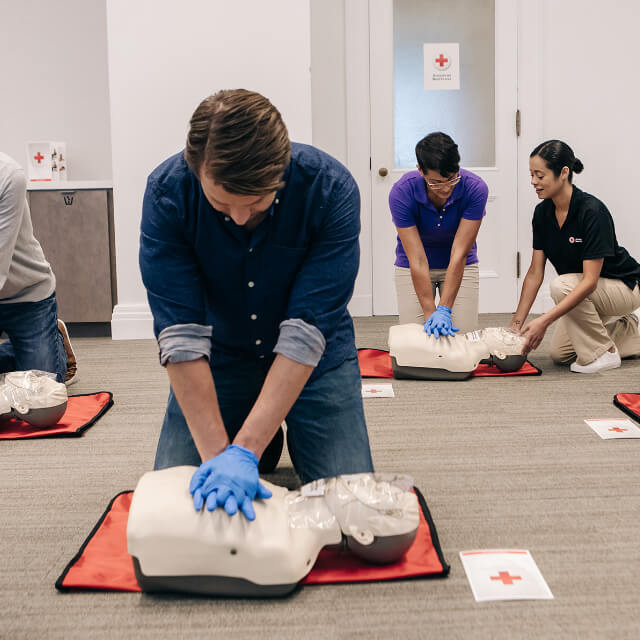What Do You Learn in a CPR Class?

CPR training is one of the most common life-saving procedures practiced throughout the world. Through a combination of chest compressions and rescue breaths, CPR helps to pump blood through the body when the heart is incapable of doing so. While relatively straightforward, this procedure can make the difference between life and death for the victim of cardiac arrest or a heart attack.
In just one year, over 475,000 American lives are lost due to cardiac arrest. This condition takes more lives than most cancer types, auto accidents, influenza, and pneumonia combined. But what makes this such a unique condition is that bystanders, even those without medical training or knowledge, can make an impact.
CPR saves lives. Since so many cardiac arrest episodes and heart attacks occur outside of hospitals, it’s critical that we take it upon ourselves to learn this simple, yet effective, life-saving procedure. Get your CPR certification today!
With each minute that passes following a cardiac arrest episode, the victim’s survival rate decreases by 7 to 10 percent. In fact, the Center for Diseases Control (CDC) reports that the survival rate can be tripled if CPR is administered within the first few minutes.
With CPR training, you can have the skills and confidence to save a life. Here, we take a look at some of the things you’ll learn in CPR training and the ability to receive your complete certification online.
MEDICAL KNOWLEDGE
In addition to learning the steps of CPR, these training programs also provide you with a foundation in medical knowledge that can serve you in many different ways. CPR training teaches you fundamental anatomy lessons and how the heart circulates blood and oxygen through the body.
When performing CPR, it’s important to know why you’re performing specific steps. This is why medical knowledge and terminology is a core principle for these classes. If you’re a medical student, these courses can give you an advantage in your other courses. Suppose you’re already a professional in the medical field. In that case, CPR training can help you brush up on the important fundamentals of the heart, circulatory system, and how to apply chest compressions and rescue breaths properly.
HANDS-ON EXPERIENCE
Absorbing new information through books, videos, lectures, and now even digital modules are effective for learning new materials. However, sometimes there’s just simply no replacement for hands-on experience. This rule is especially true for medical professionals who realize there’s a big difference, for example, between reading about a surgery and performing one.
That’s why CPR training is so important. These courses, even the online versions, allow you to first learn, and then practice, the important steps to this life-saving procedure. By repeating and practicing the steps in real life, you’ll be more confident to perform CPR if the need ever arises.
CPR CERTIFICATION
When you successfully complete your CPR training course, you will be officially certified. Many programs even allow you to download your certification instantly. For many professionals in the medical field, it’s essential to their jobs to receive this certification. Additionally, most certifications expire in a year, which is why recertification courses are just as important.
Beyond just nurses and doctors, many other careers require (or highly encourage) training in CPR, ACLS, PALS, and first aid. Firefighters and police officers both must receive CPR certification as they are often the first to arrive on the scene of an emergency. Many people may not realize that other professions, such as electricians and flight attendants, also require CPR certification. If you’ve ever thought of pursuing any of these careers, you should certainly consider these training classes.
CONFIDENCE
Studies show that 70 percent of people wouldn’t perform CPR on someone who needed it over fears of doing it wrong. Whether they think they might hurt the person, catch a disease, or touch them inappropriately, this fear leads to countless deaths that could have been prevented.
By being trained in CPR, you gain a very valuable, yet intangible, asset: confidence. In terms of life-saving procedures, CPR is not overly complex or complicated, and yet, the studies show that so many people hesitate to take action. By becoming certified in CPR, ACLS, or first aid, you’ll gain the confidence by knowing you have the knowledge and you’ve practiced the skills to make a difference.
ONLINE CPR TRAINING
In recent years, education has been revolutionized through digital tools and online classes. Especially during the recent COVID-19 pandemic, online courses have become increasingly popular. Recent studies have shown that 33 percent of college students in the United States are now taking at least one online course.
With such a rise in popularization, online classes and training have become more sophisticated, advanced, and convenient. Many programs in CPR and first aid training now offer their entire courses online. What does this mean? Imagine getting your certification without ever having to battle traffic, confusing campuses, and crowded classrooms. Online training brings the instructors, tools, and lessons to your fingertips with the same high-quality certification.
CONCLUSION
Cardiac arrest is one of the leading causes of death in the United States. One of the reasons this emergency is so deadly is because it can strike at any moment. In the United States alone, over 350,000 cardiac arrest episodes occur outside of a hospital. Of these incidents, nearly 90 percent prove to be fatal. These are numbers that must be addressed.
By training in and becoming certified in CPR and ACLS, you can make a difference and have the skills, knowledge, and confidence to save a life. Most CPR training programs can be completed within days. With new online CPR courses, you never need to leave your own home’s comfort to gain all the skills and knowledge you’ll need. So, the only question that remains is what are you waiting for? Learn more about CPR training and see how you can make a difference.